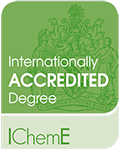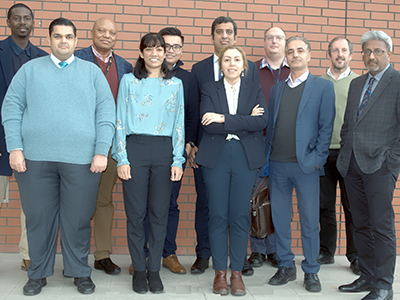Course overview
You cover a range of advanced chemical engineering subjects, broadening and deepening your understanding and knowledge of the field. You have the opportunity to develop your skills in synthesising information from a wide variety of sources and developing your decision-making abilities in solving complex chemical engineering problems. Themes within the course include sustainability (recycling, better use of raw materials) and electrochemistry (battery technology and renewable energy).
This course provides you with an industrially, commercially and professionally relevant education by developing your lifelong learning skills, fostering an ethos of continual professional development and giving you a progression route for further professional development. Teesside University has a 50-year history of teaching chemical engineering. We have core staff with direct experience of working in or with the chemical engineering industry, in the UK and overseas. You use our impressive lab facilities for your research - we have a separations lab with absorption and distillation columns, a catalysis lab and fermentation processing unit. You may have the opportunity to link in with our ERDF-funded project on the development of hydrogen economy and other on-campus and regional industry-based research projects. Our chemical engineering graduates have gone on to work for companies including SABIC, Johnson Matthey, Sembcorp, GlaxoSmithKline and CF Fertilisers.
Course details
Course structure
Core modules
Advanced Chemical Engineering Design
This module will enable you to explore the use of industrial standard modelling and simulation software in the design of complex chemical engineering unit operations. You will use the knowledge and skills gained to produce a computational design of a chemical plant.
You will also learn about the business and regulatory aspects of process design and development in chemical engineering.
The assessment comprises of 100 percent course work. It consists of group produced portfolio where evaluation of an individual contribution will be based on tutor moderated self and peer assessment.
This module covers multiphase flow and computational fluid dynamics for various engineering applications, and incompressible and compressible flow applicable to flight of subsonic and supersonic aircraft.
In addition it includes a revision of the fundamental fluid flow and thermodynamic governing equations, introduction to CFD, multiphase flow, subsonic and supersonic around wings, flow through nozzles and diffusers, oblique shock waves and expansion waves, shock wave and boundary layer interaction.
The module content will be delivered by lectures, seminars and laboratory sessions. This will include a series of keynote lectures delivered by academic staff providing the core of the learning experience, supplemented by problem-solving seminars and IT-based laboratory sessions providing an opportunity to explore complex flows through the use of CFD codes.
You gain an insight into the principles of electrochemical systems and the supporting theory. Also applications of this technology such as electrolysis processes, batteries, and fuel cells will be considered. The module examines the relevant kinetics and thermodynamics theory to model the mass transfer and diffusion effects observed.
You investigate an area of engineering and work independently to a level recognised to be at the forefront of the discipline. The topic can be in the form of a research project or a design project. Key skills in research and in knowledge application and creation will be developed through keynote lectures and self-managed independent study. You are required to demonstrate the capacity for a comprehensive and objective analysis, and for developing innovative and constructive proposals for the solution to the project topic.
Process Improvement and Optimisation
Although the chemical industry has spectacularly changed within the last decade, there is still demand and ongoing need for process improvement and optimisation, to align technology to market needs by producing “lean and mean” designs.
You gain a sound understanding of the complex concepts of process improvement and a working knowledge of the sophisticated optimisation techniques that are applied to the design and control of chemical engineering processes.
Based on a thorough technical analysis of the chemical process, quality improvement measures will be proposed in order to optimise the reaction and operation conditions. In this respect, the use of catalysts with high activity and selectivity will be foreseen along with advanced flow reactors, while designing a new technology or re-designing an existing one. The standard optimisation techniques will be introduced and the most beneficial applications will be identified.
Quality, Health, Safety and Environment
The module provides an understanding of the aims, responsibilities and means to achieve effective Quality, Health, Safety and Environment (QHSE) management systems in Oil and Gas related organisations.
This module presents a number of core and specialist areas appropriate for effective management of QHSE in a successful oil and gas related organisation. Critical components of Safety Management (including a QHSE plan, process safety, hazard identification, safety auditing and managing risk) form a comprehensive part of the core study underpinning the total Safety Management System (SMS). Where appropriate, actual industry examples are used as case studies to enhance the students’ learning and to demonstrate the mechanisms used, and impact of, legal and administrative compliance. Further, the relevance of occupational health and safety and also sustainability in safety are discussed in terms of best industry practice.
The importance of implementing a Total Quality Management (TQM) system and the impact on the industry/organisation will be emphasised to students. Environmental drives and current issues, including an Environmental Impact Assessment will complete this part of the programme content.
Sustainability in Chemical Engineering
This module covers environmental assessments such as life cycle assessment, environmental impact assessment and environmental management system on environmental impacts from industrial and human activities. You also gain an understanding of sustainable engineering strategies such as clean technology and renewable energy to address current environmental issues.
Modules offered may vary.
How you learn
You learn through lectures, seminars and practical sessions. Lectures provide the theory while practical sessions give you the opportunity to put what you've learned into practice, applying your knowledge to specific problems. Industry-specific software is introduced and used in practical IT labs to ensure relevant experience for your career goals. Seminars allow you to explore relevant topics in depth. You also complete an MSc research project.
How you are assessed
The course assessment tests subject knowledge, independent thought and skills acquisition. Assessments are robust, equitable and manageable and incorporate both formative and summative assessment opportunities.
Assessment varies from module to module, including assignments, portfolios, group work, technical reports, oral presentations, formal exams or dissertation.
Entry requirements
You need a first degree in chemical engineering, process engineering or relevant engineering discipline equivalent to at least a UK second class (2.2) honours degree.
Students with a degree awarded outside the UK must also meet the University's minimum English language requirements.
International applicants who need a student visa to study in the UK should check our web pages on UKVI-compliant English language requirements. The University also provides pre-sessional English language courses if you do not meet the minimum English language requirement.
For general information please see our overview of entry requirements
International applicants can find out what qualifications they need by visiting Your Country
Employability
Career opportunities
Chemical engineers are employed worldwide in activities including research and development, design and plant operation. They are involved in a wide range of sectors including utilities, construction, defence, chemicals, oil, pharmaceuticals, energy and environment.
Information for international applicants
Qualifications
International applicants - find out what qualifications you need by selecting your country below.
Select your country:
Useful information
Visit our international pages for useful information for non-UK students and applicants.



